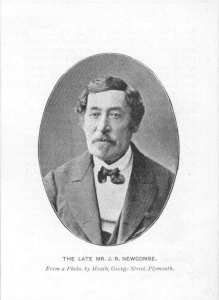|
OLD PLYMOUTH
. UK |
||
|
© Brian
Moseley, Plymouth Webpage created: September 15, 2019 Webpage updated: January 04, 2020 |
||
|
JOHN REILLY NEWCOMBE (1803-1887) John Reilly Newcombe was born on March 20th 1803 at Bath in Somerset, where he met and married his wife.
Mr Newcombe was the lessee of the Theatre Royal for a very long time. Indeed, he witnessed his Theatre go up in flames on three occasions, in 1853, 1863 and again in 1878. It was said that on those occasions he was both excited and resolute. Those events are perhaps understandable when one notes some of the theatrical sensations played out on the stage at the Theatre Royal: the Oxford/Cambridge boat race; a ship on fire; a railway collision; hot air balloons; a dynamite explosion; a man being knocked down in full view of the audience; and another being 'nearly roasted in a steel works'. But during Mr Newcombe's residence the times changed, as they do. The Theatre Royal lost its own theatrical company in 1874, after which it relied on touring companies. As the salaries paid to star actors and actresses went up, so fewer of them came as far west as Plymouth. So occasionally the Theatre staged a circus, or the Christy Minstrels, or the odd violinist and conjuror. Even a female impersonator, Lu Lu, made his first appearance on the stage of the Theatre Royal at the instigation of Mr Newcombe. Mr Newcombe himself led a very quiet and frugal life and was thought to have amassed considerable wealth. None the less, it was said that he was always ready to help a friend in need, with either advice or money. He was described as 'not a great actor but a good actor, especially in light comedy'. He entered into his parts with zest and always did the full run of the pantomime. He often took over parts at very short notice, when an actor suddenly left the production. He played Tom Tape in the farce "Stage Struck", while his granddaughter, Francie, played Sally Scraggs, her first dramatic part. Being an accomplished horseman, he often rode with the hunt. He also raced his horses, "Jack in the Box", "Lisp" and "Pollio" at the Plymouth Racecourse and one year won the Ivybridge Hunt Cup. He usually wore his scarlet hunting coat around the Town, by which he was easily recognisable. Mr Newcombe contracted erysipelas but although the symptoms were contained the treatment left him in a state of exhaustion and unable to take nourishment. He was unconscious for several days, in which state he died at 4am on the morning of Monday July 18th 1887, at the age of 84 years. He is buried alongside his wife and sons at Plymouth Cemetery, marked by a marble monument. He and his wife had four children. The eldest son, Albert Newcombe, died suddenly in 1882. Arthur Newcombe died in 1885. The eldest daughter, Miss Emily Newcombe, married Mr Henry Erastus Reed (1827-1910), the leader of the Theatre Royal's orchestra and eventual lessee of the Theatre Royal, while the younger daughter married a Mr Mead.
|
||
